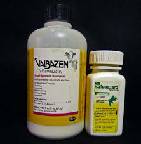
The benzimidazoles are a large chemical family used to treat nematode and trematode infections in domestic animals. They also have limited activity against cestodes. They are characterized by a broad spectrum of activity against roundworms (nematodes), an ovicidal effect, and a wide safety margin.
Those of interest are Mebendazole, Flubendazole, Fenbendazole, Oxfendazole, Oxibendazole, Albendazole, Albendazole Sulfoxide, Thiabendazole, Thiophanate, Febantel, Netobimin, And Triclabendazole. Netobimin, Albendazole, And Triclabendazole are also active against liver flukes; however, unlike all the other benzimidazoles, triclabendazole has no activity against roundworms.
Benzimidazoles are sparingly soluble in water, they are generally given PO as a suspension, paste, or bolus, although topical formulations have also been developed.
Differences in the rate and extent of absorption from the Gl tract depend on such factors as species, dosage, formulation, solubility, and operation of the esophageal groove reflex.
The most effective of the group are those with the longest half-life, such as oxfendazole, fenbendazole, albendazole, and their prodrugs, because they are not rapidly metabolized to inactive products.
They are more effective in ruminants and horses, in which their rate of passage is slowed by the rumen or cecum. PO administration of a full dose at 12-hr intervals increases their efficacy, even against benzimidazole-resistant worms.
In addition, a reduced feed intake, which reduces the flow rate of digesta, increases the availability of benzimidazoles.



